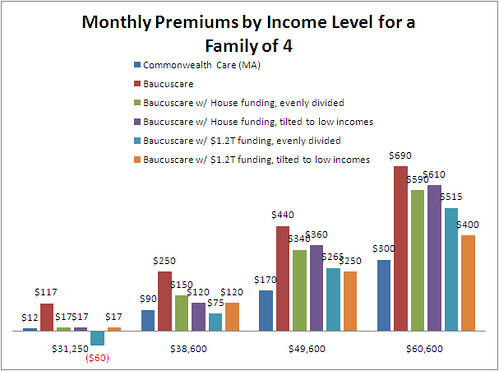People in Massaschusetts are by and large satisfied with the Connector. It's toughest on the fairly small number of families earning just over 300% of FPL (of which there aren't that many), and on the larger number of young individuals who make just over 300% of FPL (which is $32,320 for an individual, so there are a decent number of those folks). Working class families earning up to 200% of FPL have fairly low premiums. $90 per month is going to pinch, but for uninsured households, they'll get some real value out of that: Commonwealth Care plans include dental insurance, wellness checkups have low co-payments; chronic disease care is especially well covered, and so forth. Likewise, three hundred pre-tax dollars a month for a family with a gross income of $60,000 per year is Real Money, but it's not going to break the bank....
But as you can see from the graph, the Baucus bill doesn't fare as well. It's not even close to faring as well. The eight million individuals without insurance who earn between 200% and 300% of FPL will pay more than twice what similar households in Massachusetts currently pay. And working class families will feel a real pinch; $250 per month ($3,000 per year) for a family of four with an income of $38,000 is going to hurt.
And here's a bar graph for you:

I told you this was going to suck worse than Romneycare. Once again, Democratic politicians want to pass legislation that hurts the income group that most strongly supports them.
The stupidest political party in recorded history. EVAH!

Where does $12,500 per year on a $77,000 household fit in? That's the nut on a shared payer plan (public employee) and the income includes my wife's. The twelve grand does not include the town's contribution. When they want to control costs, they just want me to pay more so they won't have to.
Another shot of reality for those who think teachers pay nothing for their health care.